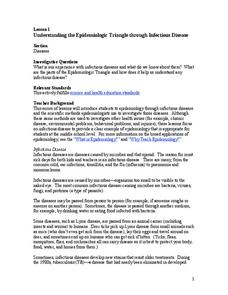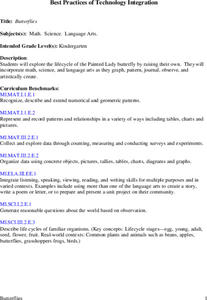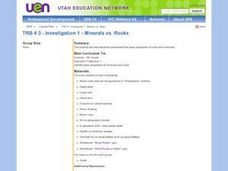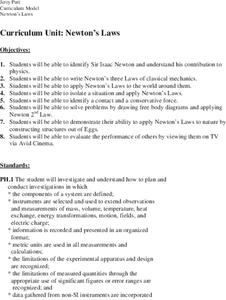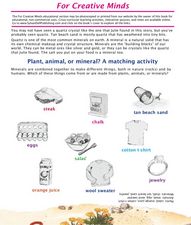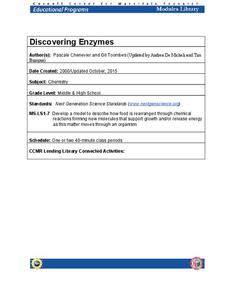Curated OER
Penguins
Students are immersed in the experience of finding facts and experiences surrounding the concept of penguins. They Go to Banners homepage to read about penguins and then use Kidspiration to conduct a KWL web. Then students complete an...
Curated OER
LD50 of NaCl to Gammarus spp.
Students learn the meaning of LD50 through lecture and discussion. Through experiment, students graph and calculate the LD50 of salt on fresh water amphipods. Students compare results of the experiment with pesticides and pollutants.
Curated OER
TIN CAN TREAT
Learners conduct an experiment where they will change a liquid dairy product into a solid. They review the definitions of liquids and solids. Students are given an example of each. They are divided into groups of four, each group is...
Curated OER
Understanding the Epidemiologic Triangle through Infectious Disease
Students examine the epidemiologic triangle. In this disease lesson, students discuss infectious disease as they study how they spread and discover their families' experiences with them. Students research Internet sites to complete...
Curated OER
Disproving the Proof
Students investigate the progression of discoveries that have led to the genetics knowledge that scientists currently have. They determine how genetic experiments disproved previous theories on inheritance.
Curated OER
Butterflies
Students will explore the life cycle of the Painted Lady butterfly by raising their own. They will incorporate math, science, and language arts as they graph, pattern, journal, observe, and artistically create.
Curated OER
Flotation
Pupils examine how one of the ways the mining companies extract coal is through the flotation method where air bubbles float coal particles to the top of a solution. The coal is scooped off and separated. They participate in the "Popcorn...
Curated OER
Are We There Yet?
Learners make their way to British museums. In this field trip opportunities lesson plan, students visit the The Deep, the Science of Sport, the Castle Munster, or High Beeches online on in person to experience hands-on science instruction.
Curated OER
Minerals vs. Rocks
Fourth graders are introduced to the characteristics of a variety of minerals and rocks. As a class, they are shown rocks and minerals and asked to describe them as a geologist would. They work together to measure and record their...
Curated OER
As a Matter of Fact
Students rotate through various hands-on experiment stations to explore the concept and properties of different types of matter. They compare some properties of solids, liquids and gases and describe how matter changes from one state to...
Curated OER
Newton's Laws
Students examine and discuss Newton's Laws and discover his contribution to physics. In groups, they participate in an experiment in which they much apply the Laws to the world around them. They describe contact and conservative forces...
Curated OER
Is Dilution the Solution To Pollution?
Students demonstrate the meaning of dilution and concentration and how pollution can affect the water that you drink. They perform an experiment to calculate the final concentration and dilution factor of solutions. They record the color...
Curated OER
Solids, Liquids, and Gases
Students explore solids, liquids, and gasses and categorize and describe the three states of matter. In this chemistry lesson, students categorize items as solid, liquid, or gas based on the definitions given by the teacher. Students...
Curated OER
Fatty Food
Learners explore nutrition by participating in a balanced diet activity. In this eating habits lesson, students analyze their own diets and discuss the foods they have eaten that day. Learners utilize grocery bags, scissors, Ziploc bags...
Curated OER
For Creative Minds
Students study pictures of plants, animals, and minerals. Students classify the pictures into the three groups. In this rock identification instructional activity, students complete a rock finding lab experiment by finding, cleaning,...
Curated OER
Acid Rain and pH
Students study acidic and alkaline balance. In this acid and pH levels lesson, students read information about pH, the formation of acid rain and its impact on environments. Students then complete an experiment to learn about the...
Curated OER
Where Are the Dinosaurs?
Young scholars explore what the dinosaurs were like. In this dinosaur lesson, the teacher peaks student curiosity about dinosaurs. This lesson would be a great starting point for a dinosaur unit since it primarily engages student...
Curated OER
Remember the Egg!
Students investigate how to see, describe and draw faint or subtle features on an object which is thought of by most people as having a smooth, featureless surface. The exercise is important to reinforce skills in making observations...
Curated OER
Science Show
Learners research topics. They teach a lesson based on their chosen topic to other students.
Curated OER
Using Science Skills to Investigate Japanese Quail
Sixth graders explore Japanese Quail. They generate and record scientific questions about the quail. Students gather information from various sources and record their data. They compose an inquiry report and include it in a portfolio.
Curated OER
A Climate Conundrum
After viewing a video and reading an article about the threatened turtles and tortises in The Amazon River area, collaborative groups create a poster or presentation about how we can help them. Several links to other related lesson plans...
Curated OER
Friends on the Farm
Young farmers explore the world of farm animals. They are introduced to a variety of animals, what their role is, how many legs they have, and what sounds they make. Worksheets and websites embedded in the plan are used to carry it out....
Curated OER
Human Genetics Lesson
Youngsters are assigned the task of interviewing a family member or a neighbor and asking them about any genetic disorders that are present in their family history. They pretend that they are about to have a baby that is carrying a...
Cornell University
Discovering Enzymes
Explore the function of enzymes through a series of lab investigations. Learners use household enzymes such as hydrogen peroxide to model the role of enzymes. The enzymes break down proteins with and without a catalyst.



